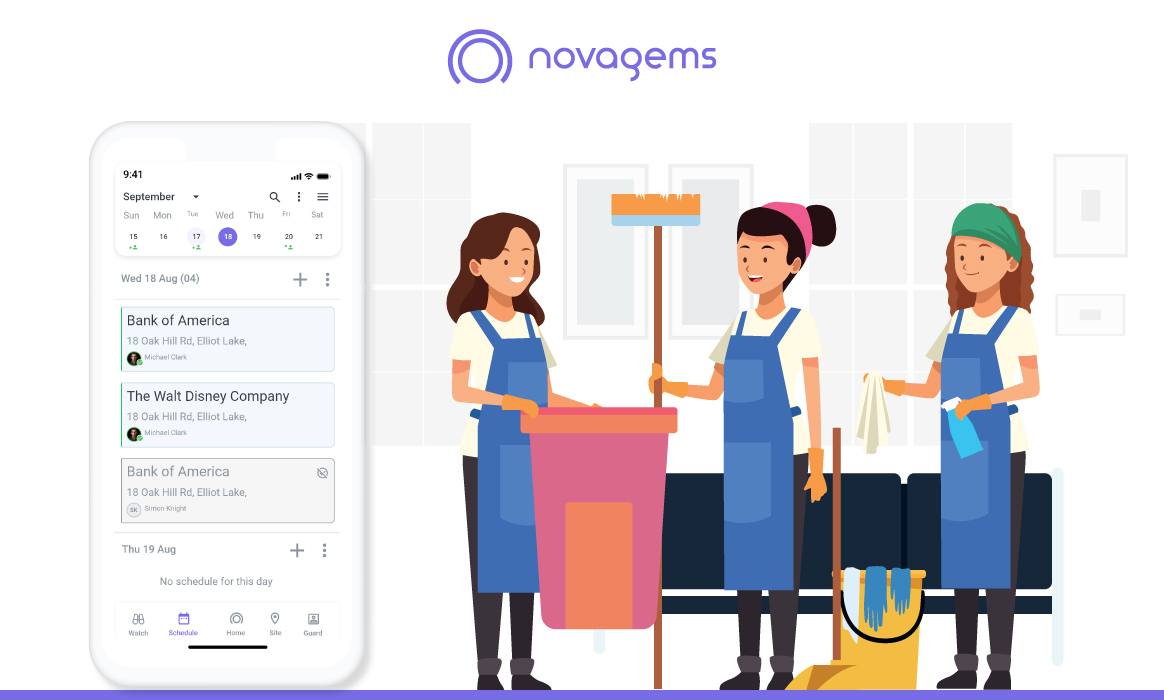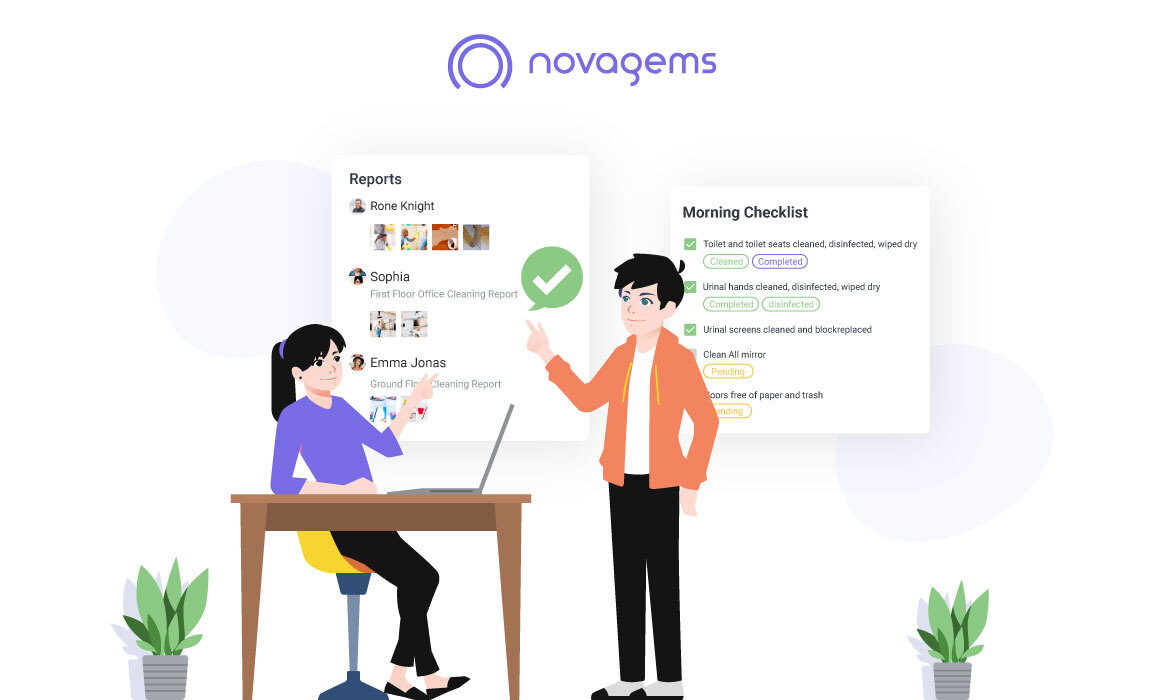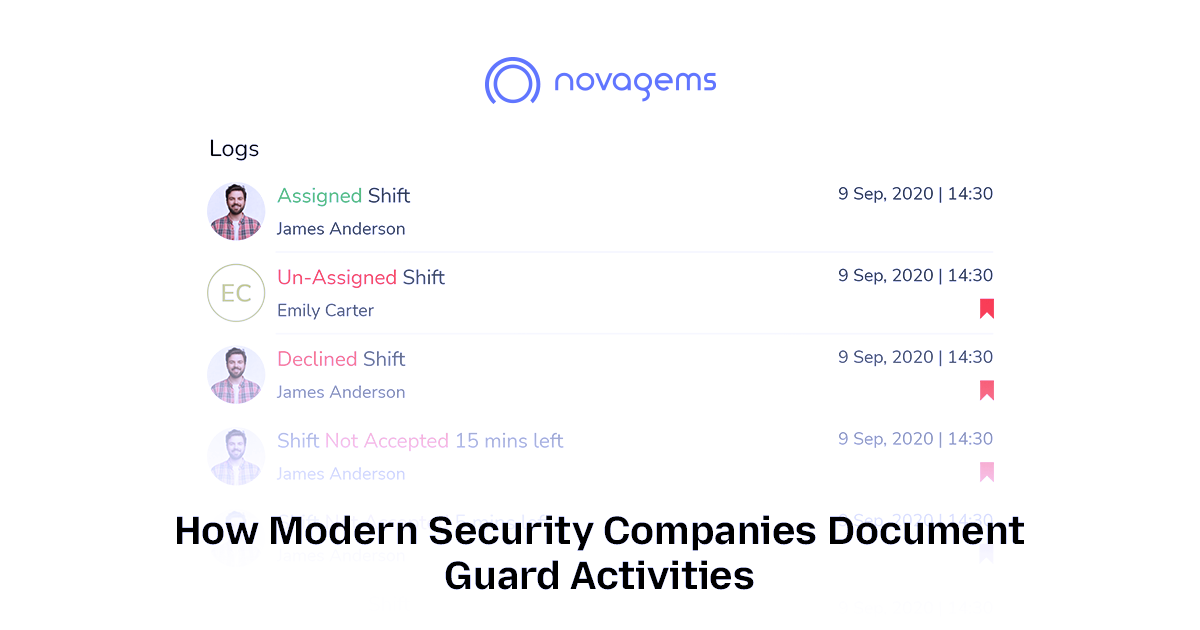Effective Communication Strategies for Growing Cleaning Companies
Published on: Mon, May 20, 2024
Read in 14 minutes

Key Takeaways
- Clear communication, scheduling, and performance tracking are the backbone of efficient cleaning staff management.
- Using digital tools for attendance, route planning, and audits can cut admin time by up to 40%.
- Recognizing and rewarding cleaning staff boosts retention and job satisfaction.
- Safety and compliance training protect your team — and your reputation.
- Management software like Novagems centralizes all workflows, saving time and preventing costly errors.
Introduction
Managing a cleaning team is no easy task. Between late arrivals, miscommunication, and uneven quality, keeping everyone on the same page can feel like chasing dust — literally.
But here’s the truth: cleaning companies that invest in structured management systems see up to 30% higher productivity (source: Statista Facility Management Report).
Whether you manage a small janitorial crew or a multi-site cleaning operation, this guide will show you how to manage your cleaning staff efficiently — using proven systems, smart communication, and modern technology.
Why Efficient Staff Management Matters
In the cleaning industry, staff management is the engine that keeps everything running smoothly. Every task — from sweeping to sanitizing — relies on people being in the right place, at the right time, with the right tools. Yet, many cleaning businesses underestimate how much effective staff management directly impacts profits, client satisfaction, and brand reputation.
When management systems are organized, teams become more productive. Employees waste less time waiting for instructions or supplies, supervisors spend fewer hours fixing scheduling mistakes, and clients receive consistent, high-quality service. This translates to fewer complaints and more repeat contracts — the lifeblood of every cleaning company.
Efficient management also helps build trust internally. When cleaners feel supported, informed, and fairly treated, morale skyrockets. They take pride in their work and become ambassadors for your brand. Studies show that companies with engaged frontline staff experience up to 21% higher profitability (Gallup Workplace Engagement Study, 2024).
From an operational standpoint, strong management practices also protect your business legally and financially. Proper attendance tracking, safety training, and performance documentation reduce risks of disputes, non-compliance penalties, or client dissatisfaction.
In short, efficient management isn’t just an HR task — it’s a strategic growth tool. The better your systems, the easier it is to scale, retain clients, and maintain quality across every job site.
In the ever-changing world of cleaning services, it is not that easy to stand out from the crowd. The pillars on which a successful cleaning company stands are happy and satisfied staff. Happy employees deliver exceptional service, leading to satisfied clients and a thriving business. The secret ingredient to happy cleaning staff? The answer is quite simple - effective communication for managing cleaning staff.
Many might think that to manage a cleaning staff is difficult. But what they do not realize is that it can be made simple with simple steps that make any cleaning company successful. To make your dream cleaning team, having clear communication with them is more important.
Small companies that have just entered the industry can easily communicate with their cleaning staff and manage the whole operation easily. But as cleaning companies grow the need to engage the cleaning staff, make them more productive, and effective cleaning staff management grows too. The main aim of any business is to gain more profit and make a brand for themselves in the industry.
And if they can communicate this same goal to their cleaning staff then the overall productivity of the company is increased. Now just imagine. If a cleaning services company is not communicating properly with the staff. What do you think will happen? The company will face -
- burnout employees
- the average quality of work
- dissatisfied clients
- high turnover rates
- high labor costs.
It is enough to give nightmares to cleaning companies’ business owners. But how to manage the cleaning staff? And that too in such a way that they do not fear micromanagement and are happy to work for the company? Fear not, we have the solution for you. You do not have to spend hours on Google and search for the solution on “cleaning staff management” when we have curated a list just for you.
If you can follow these simple communication tactics for managing cleaning staff then you will notice visible results yourself. Driving growth and making profits will not be a dream now but a reality that can be achieved by small and established cleaning companies alike.
In this blog post we are going to share just that! Get effecrive tips for managing a cleaning staff that will help you retain the cleaning staff and boost morale.
Proven Strategies to Manage Cleaning Staff Efficiently
Effective staff management is a mix of people skills, processes, and technology. The key is to build a system that reduces guesswork, empowers employees, and keeps communication transparent. Here’s how top cleaning companies are getting it right in 2025:
Clear Communication Channels
This makes sure that everyone is on the same page. Whether it is a potential customer who is visiting your website, if they can easily relate and gather all the information, then that means that you were successful in delivering the message. To manage cleaning staff, having proper internal communication is essential as well. Having clear communication channels internally and externally is important. To provide exceptional customer service to the client, clear and concise communication is a must.
A simple method for managing cleaning staff is through:
- Employee handbooks
- Regular meetings
- Open door policy
- Establishing clear expectations
When everyone knows what is expected of them, they all work in the same direction. This avoids misunderstanding and unnecessary delays in providing the best to the client. Managing janitorial staff will not seem so difficult if clear expectations and objectives are conveyed. The cleaning staff will align their goals and efforts in achieving the common goal of the company.
Here’s how to ensure your cleaning staff understands their roles and responsibilities:
- Job Descriptions: Create detailed job descriptions outlining specific duties, performance standards, and areas of responsibility for each cleaning position.
- Onboarding Process: Invest in an onboarding process that familiarizes new staff with company culture. The onboarding process must be clear on what is expected and what procedures must be followed to achieve that.
- Regular Training: Provide ongoing training sessions to ensure everyone is up-to-date on cleaning techniques, industry best practices, and any changes in procedures.
Communication isn’t just about sending messages — it’s about creating clarity.
Establish a clear chain of command and standardized communication tools. For instance:
- Use one official communication platform (like Novagems Cleaning Management Software, Slack, or Microsoft Teams) for daily updates and alerts.
- Implement digital shift notes so cleaners receive clear instructions each day.
- Encourage supervisors to check in through voice or video calls during shifts, especially for new staff.
Creating this structure prevents confusion and fosters accountability. Everyone knows who to contact and how, no matter the time or site.
Fostering Open Dialogue
This is one of the crucial aspects of managing cleaning staff. but sadly it is mostly overlooked. What makes any staff stay in the cleaning services industry? It is a positive work culture. Create such a culture within the company that the staff is willing to stay. And help the company to gain more profit. Everyone wants to be heard and valued, if your staff is feeling that then you have achieved something. Communication is a two-way street.
To achieve open dialogue with the cleaning staff you can practice:
- Active Listening: Practice active listening skills during meetings and individual discussions. Pay attention to concerns, suggestions, and feedback from your staff.
- Employee Feedback Surveys: Conduct anonymous employee feedback surveys to gain insights into employee satisfaction. This helps to identify areas for improvement and foster a culture of open communication.
Ambiguity breeds underperformance. Each employee should have well-defined duties, supported by measurable KPIs such as:
- Tasks completed per shift
- Quality audit score
- Attendance and punctuality
- Client feedback rating
Display these KPIs transparently so everyone knows what success looks like. Hold monthly review meetings to recognize achievements and identify improvement areas. This approach transforms cleaning from a checklist job into a measurable career path.
Optimizing Work Schedules
Optimizing work schedules means managing staff scheduling in such a way that the staff is deployed efficiently and effectively. If the company is fairly new, then that can be managed easily. But once the company starts growing so will the difficulty to manage all of the schedules. If schedules are messed up, then that means appointments can be missed. And that is a big no-no in any industry as it will lead to unhappy clients and a bad name in the market.
Time theft and no-shows cost cleaning companies thousands every year. Automating your scheduling and attendance using GPS-enabled systems ensures:
- Real-time visibility of who’s on site
- Automated shift reminders
- Immediate alerts for no-shows or missed check-ins
- Digital proof of attendance for clients
With Novagems Scheduling & Attendance Module, supervisors can monitor all sites in a single dashboard, freeing up hours previously wasted on manual coordination.
That is where a cleaning company software can help you out. The software will manage overall operations from scheduling to communication and task progress. Investing in such software will give long-term benefits to the cleaning companies. When they start getting more cleaning contracts and driving growth, especially then.
Fun fact - Novagems is a software to manage cleaning staff that will take care of everything from A to Z.
Recognizing Achievements and Providing Incentives
Everybody likes getting rewarded and getting recognition when they have done good work. This motivates the cleaning staff to perform their best and give exceptional services. Happy cleaning staff means good service and happy customers. If the clients are satisfied with your cleaning services then that means you have built a recurring business.
A little appreciation goes a long way and you can deliver that through:
- Verbal Recognition: Publicly acknowledge and appreciate work during team meetings or company communications.
- Performance-Based Incentives: Consider implementing performance-based incentive programs. This can be done to reward exceptional work, meeting deadlines, or exceeding client expectations.
Promoting Teamwork and Collaboration
The strongest foundation of a successful cleaning company is its strong cleaning team. If the company is promoting teamwork then the team will work together, and support each other too. Collaboration and mutual respect between the team and the management are vital. Not only in the cleaning industry but in any industry.
- Team-Based Projects: Assign cleaning projects that require collaboration and teamwork. This motivates problem-solving skills and teamwork.
- Team-Building Activities: Organize occasional team-building activities. This can promote bonding, communication, and a sense of shared purpose within the cleaning staff.
People don’t just work for paychecks — they work for appreciation. Recognize your staff’s hard work through awards, shoutouts, or even digital badges within your management software. Small gestures improve morale and reduce turnover dramatically.
According to a Glassdoor study (2024), 80% of employees said recognition was more motivating than financial rewards. Combine recognition with fair feedback to create a balanced, motivated workforce.
Providing Regular Feedback and Conducting Performance Evaluations
There is always room for improvement. Providing regular feedback tells the cleaning staff where they can improve. Continuous improvement builds confidence in the staff. The cleaning staff can recognize their strength. This basically means that the task of managing cleaning staff is done by the staff itself. Here’s how you can make that happen:
- Goal setting: Set clear and achievable goals for the cleaning staff. When individual goals are met, the company will thrive.
- Performance reviews: Conduct regular performance reviews to assess skills, identify areas for improvement, and provide constructive feedback that helps staff members grow.
Training shouldn’t end after onboarding. Continuous education keeps your team sharp and safe. Conduct regular refresher sessions on cleaning standards, chemical handling, equipment care, and client communication.
Digitally track certifications and renewals to stay compliant with local laws. A missed training date or expired license can jeopardize contracts or insurance coverage — something easily avoidable with automated reminders
Challenges of Managing Cleaning Staff
- High Turnover Rates
Cleaning companies often see high turnover rates due to low wages, demanding work conditions, and limited career advancement opportunities. This harms the overall performance and business of the company. To face this situation, if the management is taking steps beforehand it will help them in the longer run.
- Staff Scheduling
Managing cleaning staff schedules can be challenging, especially when dealing with varying shift preferences, last-minute changes, and unexpected absences. A cleaning company software will help the company manage schedules and meet clients’ requirements too.

- Communication Barriers
Language barriers, cultural differences, and limited access to communication channels can hinder effective communication. To overcome these barriers, provide clear and concise instructions, and utilize visual aids and demonstrations when necessary.
- Quality Control
Your client will value high-quality service above anything else. Making sure that the team delivers on that promise becomes difficult with a large team. Growing cleaning companies can face this challenge so investing in a solution beforehand is beneficial.
- Employee Motivation and Retention
Keeping your cleaning staff satisfied and engaged becomes challenging for many cleaning service providers. If they are not feeling motivated or valued they will start looking for some other option. Hence, retaining good employees is difficult nowadays. Having a well-planned and thought of retention strategy is crucial.
Tool and Technologies for Cleaning Staff Management
- Scheduling Software:
Invest in scheduling software to simplify the task of assigning shifts and managing your cleaning staff’s work hours. These tools allow you to create schedules efficiently, taking into account staff availability. With real-time reminders and notifications, you can ensure that your team stays informed and punctual.

- GPS Tracking:
This will allow you to see where your staff is at all times. Keep a check that your cleaning staff is at the right place at the right time and get instant information if they leave their designated place.
- Communication Platforms:
Utilize communication platforms such as messaging apps or project management software to facilitate seamless communication among your cleaning staff. These communication tactics for managing cleaning staff allow for instant messaging, file sharing, and collaborative discussions, enabling your team to stay connected and informed at all times.
- Time and Attendance Tracking Systems
These systems will allow you to track the time spent on each job and manage efficiency of the cleaning crew. This can prevent employee burnout and overtime which keeps everything under control.
Pro tip - Want to know how you can get all these systems in one solution? Click to learn more
Common Challenges Cleaning Companies Face
Even well-run cleaning businesses struggle with people management at times. The work is repetitive, often underappreciated, and physically demanding — which makes motivation and consistency hard to sustain. Understanding these pain points is the first step toward solving them.
Here are some of the most common management challenges cleaning companies face in 2025:
1. Miscommunication and Lack of Clarity
A single misunderstood instruction can snowball into missed tasks or client dissatisfaction. Traditional communication methods like sticky notes or WhatsApp messages are hard to track and easy to misplace. Without centralized communication, accountability disappears.
2. Scheduling Conflicts and Attendance Issues
Last-minute absences, shift overlaps, or unclear assignments often cause coverage gaps. Supervisors end up juggling phone calls or texts to find replacements. The result? Frustrated clients and stressed staff.
Automated scheduling tools now help solve this, but many cleaning businesses still rely on manual spreadsheets — a recipe for human error.
3. Inconsistent Quality Across Locations
When you manage multiple sites, maintaining uniform cleaning standards is tough. Each supervisor may follow slightly different expectations or checklists. Without standardized audit systems, one location might shine while another disappoints, putting your reputation at risk.
4. High Employee Turnover
Cleaning roles often have turnover rates of over 50% per year (Indeed Workforce Report, 2024). Reasons include low pay, lack of recognition, and limited growth opportunities. Every new hire means fresh training costs and more time before consistent performance resumes.
5. Limited Training and Compliance Tracking
Inadequate onboarding or missing safety certifications can cause liability issues. When cleaners don’t understand chemical handling or PPE procedures, it endangers both the worker and the client. Many firms fail to document training properly — leaving them exposed if something goes wrong.
6. Poor Data Visibility
Paper timesheets and manual reports make it impossible to see who’s on site or what’s been completed in real time. Without data visibility, supervisors can’t make informed decisions or prove compliance to clients.
These challenges may seem routine, but each one chips away at efficiency, profitability, and trust. Fortunately, modern technology and smart systems can eliminate most of them — if used strategically.
Conclusion
In conclusion, effective communication is essential for the growth and success of cleaning companies. The simple tips for managing a cleaning staff are basically boosting your teams’ productivity and company image in the cleaning industry.
FAQs
Q1. How can I track my cleaning staff’s performance?
Use digital dashboards to track KPIs like attendance, quality scores, and feedback. Novagems simplifies this with automated reporting tools.
Q2. What’s the best way to reduce cleaning staff turnover?
Offer recognition, consistent communication, and fair workload distribution. Empowering your staff builds loyalty.
Q3. How often should I audit cleaning quality?
At least once a week for high-traffic sites and monthly for low-traffic areas. Document audits digitally for future reference.
Q4. Is cleaning management software worth the investment?
Absolutely. It cuts admin time, reduces scheduling errors, and provides proof of service — saving money long-term.
Get a Free Trial
Sign up For Newsletter
Latest Blog Posts
Get Started
Start being productive & grow your business
with Novagems





